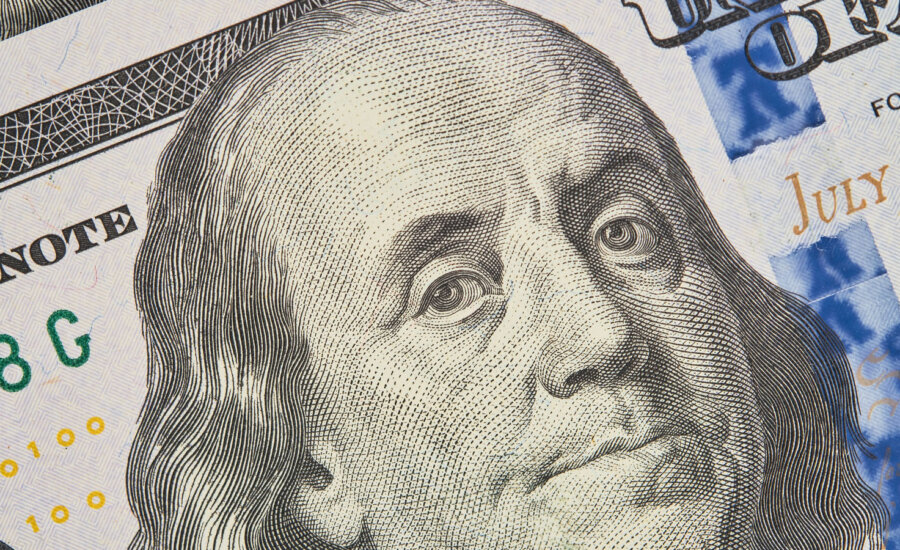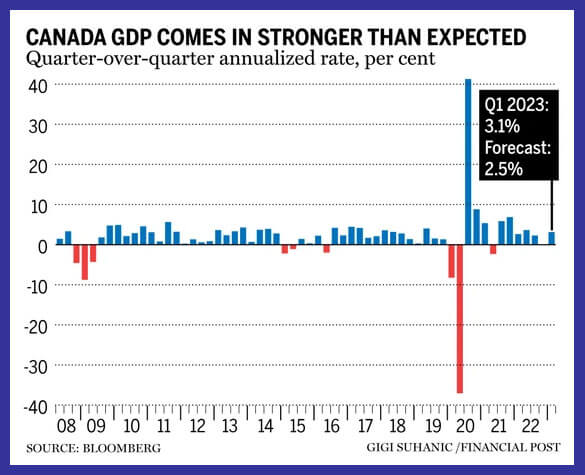Making sense of the markets this week: June 4, 2023

Presented By
Harvest ETFs
The U.S. avoids defaulting for the 247th time, Canada’s GDP blows away estimates, Lululemon enjoys an excellent quarter, and Canadian earnings are largely unsurprising.
Advertisement

Presented By
Harvest ETFs
The U.S. avoids defaulting for the 247th time, Canada’s GDP blows away estimates, Lululemon enjoys an excellent quarter, and Canadian earnings are largely unsurprising.

Kyle Prevost, editor of Million Dollar Journey and founder of the Canadian Financial Summit, shares financial headlines and offers context for Canadian investors.
Nervous investors (including myself) rejoiced this week, as America’s elected officials decided not to crash the world’s economy and make life worse for all of the folks who voted them into office.
It might be worth noting that 117 members of the House of Representatives thought avoiding collapse was a bad idea. The bill passed by a vote of 314 to 117.
Late on Thursday, the Senate passed the bill with a 63-36 vote. Global markets surged overnight in response. and U.S. futures were up roughly 0.5% before trading commenced Friday morning.
Republican representative Nancy Mace stated:
“The progressives know how good of a deal they got tonight […] This was not a compromise. Republicans got very little.”
Meanwhile, House Speaker Kevin McCarthy promptly proclaimed this bill represented “one of the best nights since I’ve been here.” He added: “I have been thinking about this day since before my vote for speaker because I knew the debt ceiling was coming. I wanted to make history.”
To give some context to these incredibly illogical proceedings, one should remember that those commenters are from the same political party!
Former President Donald Trump chimed in with: “I would’ve taken the default if you had to (sic).” This willingness to financially hurt individuals will come as no surprise to all the business partners who suffered when Trump’s companies defaulted on their debt repayments (better known as bankruptcies) several times over the years.
So, there you have it. The deal to raise the debt ceiling was either a completely inconsequential theatrical farce, or it was the historical night of Speaker McCarthy’s dreams. In any case, the most important aspect of the deal is that the U.S. government will go on paying its bondholders each month until at least 2025 (after the next election). One can only hope a more concrete solution for this self-made obstacle is found by then.
Mark Zandi, chief economist for Moody’s analytics was quoted as saying that if the bill were delayed in the Senate, “things go from being bad, to worse, to catastrophic” in a matter of days.
Confidence in a country’s ability to repay its debts to bondholders is nothing to mess with. The Government Accountability Office estimates that 2011’s debt ceiling debacle raised the government’s borrowing costs by USD$1.3 billion. Lily Adams, a Treasury spokesperson, said: “As Secretary Yellen has warned for months, brinkmanship over the debt limit does serious harm to businesses and American families, raises short-term borrowing costs for taxpayers, and threatens the credit rating of the United States.”
Reuters highlighted tax preparation services, U.S. defence companies and student loan-facing banks as potential stocks that could benefit from the relatively small budgetary changes. Overall, the world’s markets appeared to take the news in stride, as it has appeared that a compromise was likely since late last week.
Despite the fact that two-thirds of Canucks think we’re in a recession, according to a Pollara poll, it hasn’t stopped many from reaching for their wallets. Statistics Canada reports that Canadians increased their spending by 5.7% from the previous quarter, and spending on travel was particularly scorching, as it was up 6.8%.
On Wednesday, StatCan reported that Canada’s gross domestic product (GDP) had risen at an annualized rate of 3.1% for the first quarter of the year. This blew away analyst expectations of 2.3% to 2.5%, and was much higher than the 0.1% decrease we saw during the final quarter of 2022.

Of course, in response to this positive news, markets have begun to anticipate the Bank of Canada (BoC) will “take away the punch bowl” by bringing back key interest rate increases. Futures markets are now pricing in a 40% chance of a rate increase in next week’s BoC meeting, and a 100% chance of at least one rate increase by September.
Only time will tell if Canadian consumers (powered by a historically strong job market) can continue their spending at this rate, or if our pandemic-filled piggy banks will soon run empty. While it will be tough to keep that 3.1% GDP growth figure going forward, we really do need to wake up to the fact that we are most definitely not in a recession. Given how hot the U.S. jobs numbers were this week, I’d say it’s a pretty good bet that North America’s economy will continue ticking along for at least the next six months.
It’s a real mixed bag of U.S. earnings results again this week. Personal computing giants HP and Dell traded flat after reporting mostly positive quarterly earnings numbers. The market appears to be focusing on reduced future sales predictions. (Numbers in this section are U.S. currency.)
The respective earnings reports of Dollar General and Lululemon (headquartered in Vancouver, but trading exclusively on the NASDAQ exchange, and reporting earnings in U.S. dollars) have left me quite stumped, to be honest.
If we’re headed into a recession, as everyone claims we are, then discount retailers like dollar stores should be “recession-proof” places to park your capital. Luxury brand retailers such as Lululemon, historically take a hit during periods when consumers have to tighten their budgets.
Yet, on Thursday, we saw shares of Dollar General plummet 20% on mixed earnings numbers, while Lulu shares rocketed up 12% in after-hours trading, based on their earnings beat. The Lulu momentum comes despite the retailer still having issues getting inventory down to pre-pandemic levels.
I think the solution to my lack of understanding might be to create the “dollar store versus expensive yoga pants recession index,” so that we might all better understand recessions.
Metrics, like unemployment rates and GDP growth, can be debated and not always understood. The bottom line is that, if the ratio of folks willing to buy expensive yoga pants is going up relative to those who are shopping at dollar stores, then we are not in a recession.
Now let’s look at the numbers on our home turf. (All numbers in this section are in Canadian dollars.)
Laurentian Bank and National Bank wrapped up the Canadian bank earnings season with a continuation of mediocre results: Laurentian slightly up, and National slightly down. Despite healthy profits and historically-attractive valuations, the banks appear to be suffering from lower profit numbers due to higher provisions for credit losses. As I wrote last week, it’s this very same “safety-first” approach to banking that has provided Canadian banks with such enviable long-term successful track records. Both Laurentian and National announced small dividend raises, thus providing investors with a strong indicator of continued overall confidence.
Canadian aerospace and defence training company CAE saw its shares drop 7% on Wednesday despite a fairly positive earnings call. Again, we see a market that is very sensitive to decreased sales forecasts.
It was independently produced by MoneySense and is presented with financial support from the partner.
Share this article Share on Facebook Share on Twitter Share on Linkedin Share on Reddit Share on Email
I seem to remember when interest rates were falling a number of articles on other sites explaining why this was bad for instance companies such as Manulife. With falling rates the spread on investments the insurance companies had to keep was getting squeezed. In a rising interest rate environment, insurance companies should do very good. Yet this doesn’t seem to be the case, at least not to the extent I would have expected. Manulife is up 4.22% in the past five years, albeit almost 6% year to date. Sheeesh?